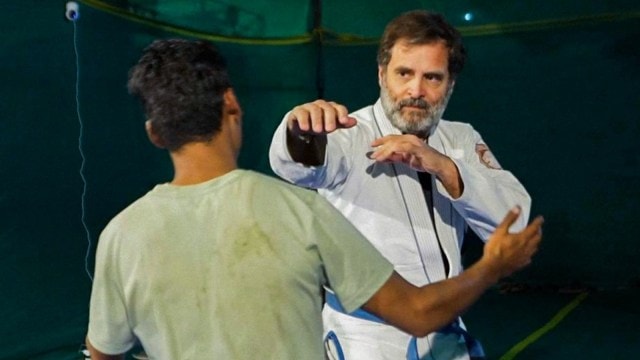
Of late, I have started paying close attention to the ways and wiles of Rahul Gandhi. I follow him on Instagram and pay heed to the speeches he makes. He is very active on social media and has taken to posting all sorts of things. Last week, he posted reels of himself chatting with Kashmiri girls in Srinagar and performing a martial art called jiu-jitsu. Many of his posts have nothing to do with politics and many of his statements are positively goofy. When he said some days ago that you would never find a Dalit, Adivasi or OBC girl competing to become Miss India, I was not sure what he meant. Becoming Miss India is not a government job that can be reserved based on caste. It is a private competition in which any Indian woman can compete? So, what did he mean exactly?
His fixation with people’s castes is not just baffling, but inane. When the Ram temple was inaugurated in Ayodhya, he said that he was disappointed not to see more Dalits, Adivasis and OBC people in attendance. Did he not notice that the Prime Minister conducted the religious ceremony, and that he comes from an OBC (other backward classes) caste? Rahul’s preoccupation with people’s castes has led him to say a lot of peculiar things. Not long ago, he declared that it saddened him to see lower castes unrepresented in Bollywood. Becoming a movie star is also not a government job. It is the box office that decides who becomes a star. It becomes hard to take the Leader of the Opposition seriously when he says things like this.
Yet, he must be taken seriously. A recent Mood of the Nation poll by India Today revealed that Rahul is seen as the man most suited to become prime minister after Narendra Modi. According to this poll, he is still some distance behind Modi, but ahead of Amit Shah, Yogi Adityanath and Nitin Gadkari. This indicates that he has come a long way from those days when he could barely make a speech in Hindi and when he did make speeches, he said confusing things like how India was not a country but a beehive. This statement was used by Modi in the 2014 elections to make the Dynasty’s heir-apparent sound unpatriotic. The country that we think of as our mother has been described as a beehive, he would declare fervently at public rallies to huge applause from the crowds.
It has taken Rahul Gandhi a decade to reach a point when he must be taken seriously as the second-most important political leader in India. But he needs to refrain from sounding eccentric because he is up against a very skilled politician who never misses a chance to rubbish him. Last week in Maharashtra, Modi reminded the vast crowd that had gathered to listen to him that there were people who went around questioning the patriotism of great patriots like Veer Savarkar. He did not name Rahul, but everyone knew who he meant.
Personally, I confess to being impressed by how Rahul Gandhi has cultivated an image of being a political leader who is the exact opposite of Modi. He has succeeded in portraying himself as a man of the people and not the princeling that he once was. He has done a good job of portraying Modi as a man who lives at such exalted heights that he has lost touch with ordinary Indians. There is no question that the reason why Modi failed to win a full majority in the Lok Sabha was because some of what his main challenger said rang true. The charge that under Modi the country’s atmosphere had become infused with religious hatred, rage and hate crimes had a special appeal to Muslims.
What Rahul Gandhi needs to start worrying about, though, are his courtiers. Ever since he has emerged as the main challenger to Modi, the courtiers are back in Delhi’s drawing rooms, boasting about how sure they are that their man will become prime minister before the next general election. Some of these courtiers are apolitical gossips, but some are more serious people whose words are listened to carefully in political circles. They all belonged once upon a time to the Durbar that encircled the Dynasty, and they drifted away when Modi won his second term. They are back now in full force, bringing with them the worst memories of that older time.
It is a good thing that there is now an Opposition leader who can keep Modi on his toes, but if that old arrogance and those old courtiers return, it will not be long before Modi succeeds in revising his image. For the moment, his magic and his appeal are so diminished domestically that it is to overseas Indians he turns for reassurance at those rallies in foreign cities that he so loves to address. But now he has competition. Next month, he travels to the United States for another ‘mega rally’.
Rahul Gandhi will be going there too and, now, as Leader of the Opposition. If he refrains from banging on about the evils of caste, he will be taken more seriously. He needs to notice how insincere he sometimes sounds. If he felt so passionately about caste inequalities, he could have uplifted the lower castes decades ago when his family reigned over India.



